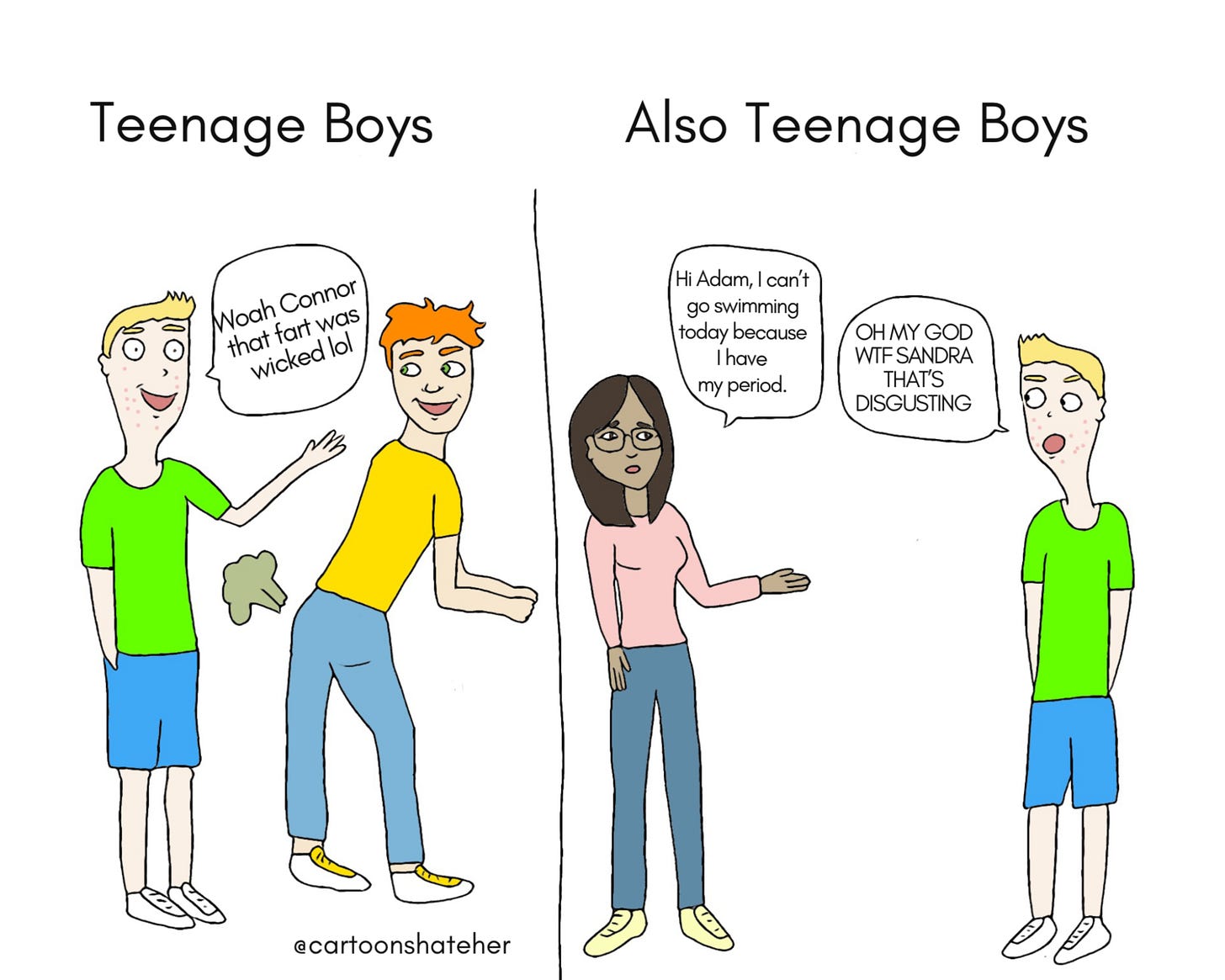What's Wrong with Boys?
People agree something bad has happened with boys, but nobody can be normal about it.
All over the media, one thing is clear: something bad is happening with boys.
Boys are doing worse in school. Boys are lonely. Boys have fallen behind girls in higher education. An article went viral for asserting that this phenomenon, combined with the societal expectation that men continue to be breadwinners, contributed to a toxic culture that re-launched Trump into power in 2024. Something being wrong with boys—or the world in which boys are raised—is the only thing on which people can agree.
But beyond that, there’s not a lot of agreement.
Some people believe that boys are struggling because girls are simply working harder. The success of girls and women today is earned, while the success of boys and men in the past was the result of unearned male privilege. They believe that boys are entitled and are coping with the fact that being a hashtag-mediocre-white-man isn’t cutting it anymore, giving up en masse because nothing is being handed to them on a silver platter. They might underscore their point with edgelord teenage boys making rape jokes, or they might point out the rise of toxic male role models like Andrew Tate.
On the other side of the aisle, other people believe that boys and men are the victims of what has become an oppressive matriarchy—that the patriarchy either never existed, or if it did, it was a good thing (ah, the classic “this never happened, but if it happened it was good” paradox.) They believe girls and women are being given opportunities that boys and men aren’t, and that if boys are “giving up,” it’s a reasonable response to being a marginalized group with little opportunity. They might not specifically endorse Andrew Tate, but they might argue that it’s natural for boys to gravitate toward someone like that if it’s drilled into their heads that they are “evil oppressors.”
Of course, like most issues, this is nuanced, but people can’t seem to be normal about it.
(Obligatory only somewhat relevant comic)
I remember having lunch with a female friend a year or two ago. She’s a serial entrepreneur who has started multiple tech companies—easily the most career driven woman I know, and a feminist. But in a hushed tone, she said that she worried about the messaging directed at her two children—one female, one male. She said, especially as a woman in tech, she saw lots of initiatives aimed at improving women’s opportunities and outcomes, pushing girls into STEM and encouraging girls that “they can do anything.” But she didn’t see any of that for boys. She understood why—there’s no reason to declare “boys can do anything,” when there’s no precedent for boys being told to get back in the kitchen. But her son, who at that point was two, had no understanding of this historical backdrop. She worried that he would eventually perceive this one-sided messaging as a sign that he wasn’t as capable as his sister. But she also worried that encouraging him on the basis of his gender—essentially flipping the genders and saying “you can do anything, because you’re a boy, and boys are strong and special”—would imply male superiority. The gender equivalent of “white history month,” if you will.
I got where she was coming from. As someone who writes frequently about the relationship between men and women, I can’t seem to acknowledge an issue facing one gender without the other gender feeling insulted. When I wrote The Men Who Sabotage Women’s Fertility, about the role men play in delaying reproduction, men got mad. They insisted that it was impossible for a man to waste a woman’s time, and the blame falls solely on women for failing to demand a proposal (something tells me these same men would consider that behavior “crazy.”) They were also mad that I didn’t take women to task for initiating the majority of divorces, and insisted high-earning men were dropping out of marriage en masse because of unfair divorce laws (I wrote about this too, and it’s not true.) Meanwhile, when I wrote about young people’s anxiety around sex after the election, I got some heat from women for not being empathetic enough to the 4B sex strike movement and not condemning right-wing men strongly enough. Women felt that by focusing on anxiety around dating and gender relations—even though I interviewed men and women—I was glossing over the more important issues of women’s rights and women’s safety.
When it comes to the current dynamic between boys and girls—the fact that boys appear to be falling behind and turning to fairly toxic ideologies as a result—it feels impossible to navigate. Either boys are oppressing girls (or attempting to oppress girls and failing) or girls are oppressing boys. I take issue with both of the stances, because we’re talking about children. I don’t think you can accuse children of oppressing anyone. And when you talk about children and the messaging children receive, you have to view the world from the eyes of a child.
So imagine you’re a little boy, or even a teenage boy. Is our current messaging hitting the mark?




